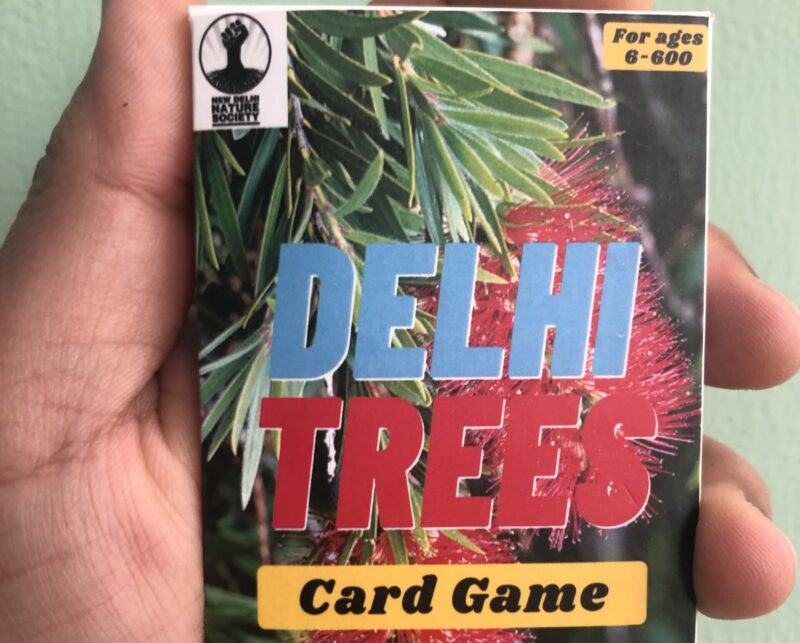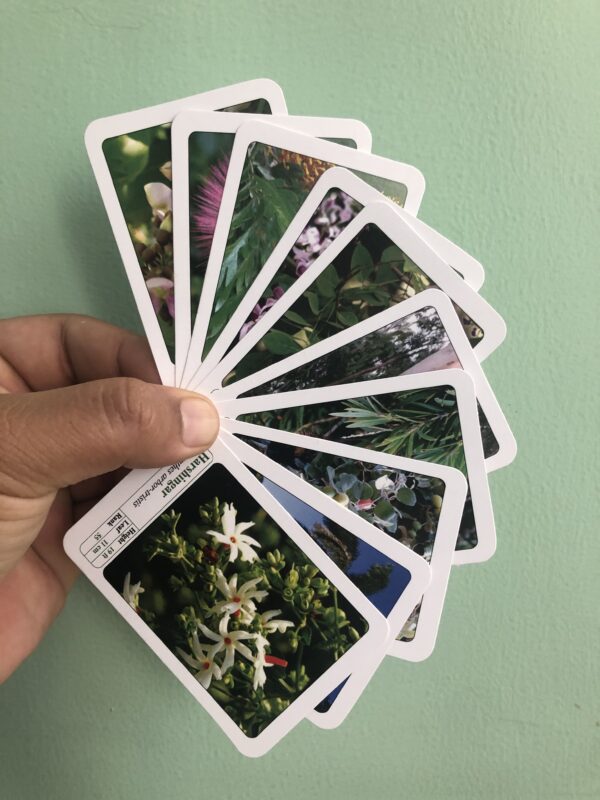When Kirthi Mishra’s son turned 10 this year, she felt it was time to have a talk with him about the importance of trees in our lives. She decided to use the Delhi Trees card game which was launched in early 2021 by environment activist Verhaen Khanna.
“Tackling climate change and balancing the environment have always been two of the greatest challenges of our time, and the pandemic has furthered the same. I wanted my son to understand how important trees are in our lives. With the card game, he is able to identify the species of trees around us”, says Mishra.
The deck of 60 cards is made of paper and is fully biodegradable, unlike plastic cards. The game is suitable for all age groups and can be played by two to six players. It is similar to those WWE card games people used to play where outwitting ranks and physical configuration of the wrestlers helped players win the game.
Players can compare and compete with height, leaf size and rank of trees from smallest to tallest to powder puff and bottle brush. “These are some of the most common trees in the city. Their flowers are highlighted, so people can remember names and identify them better when they step outside”, says Khanna, who has sold 200 copies of the game so far and is actively promoting it on social media and WhatsApp groups of parents.

There’s a description on the back of the card game pack that talks about a fast-spreading ‘disease’ called ‘Tree Blindness’. This malady causes the afflicted to walk into trees, drive into trees, or completely look through a tree being cut outside their house. The ultimate cure available for this ailment is to learn the names of the trees and spend more time around them.
Khanna wanted to fix this mass ignorance. “A few months ago, everyone was distressed and searching for oxygen cylinders. The moment you remember those tough days, tears roll down the cheeks. Thousands of trees are being cut for projects of the Delhi Metro, for Ring Road and the Central Vista. The capital also has the highest air pollution”, points out Khanna, adding that it’s the reason why we are always left gasping for breath.
“Scientists and researchers have been studying the climate change issue since the 1800s. I came across a study that says the oxygen-producing capacity of a healthy tree in a year is worth Rs 24 lakh. You just can’t picture your life without nature, simple,” adds the 32-year-old who has been trying to get people to learn the names of trees via his NGO Delhi Nature Society. They often organise tree-climbing activities, tree-hugging and tree census programmes where people count trees in their area.
During the lockdown last year, Khanna started working on his card game idea so house-bound children could play the game with elders and keep a sense of nature alive.
How to play?
Khanna explains the game’s rules thus: “Each card has the name of the tree, a picture and the categories for composing with the other cards — tree height, leaf size, rank. The trees which are taller and have bigger leaves have been given better ranking since they have more leaf surface area which helps reduce pollution and create oxygen. The smallest trees with the smallest leaves will have lower ranks. Rank 1 is the best or highest and rank 60 is the lowest. This game can be played with up to six players.”
And though no one lives so long, the card pack says it is suitable for ages 6-600. It is the positive feedback of the parents that keeps the environment activist going on this path. Beaming with great pride, he says, “During the lockdown, children were stuck at home, so just by playing this game they learnt the names of several trees in the city. When the lockdown was lifted, they were able to identify the trees in their neighbourhood.”

He also created another card game titled ‘Rewild yourself: 30-day challenge’. This 30-card set chalks out one new mission for each day. Not only will they improve our connection with nature, but they are also a great gift for a nature lovers. The tasks include looking at birds for 15 minutes, hugging a tree, meditating for 11 minutes, sleeping under a tree, and other nature-friendly activities.
Dealing the globe
While Khanna’s card game attempts to bring kids closer to nature, Priyanka Prabhakar’s ‘Country Trump’ card game is all about making the geography subject interesting and engaging. Most of us can relate to the hard times of memorising the capitals of countries, marking rivers and mountains on maps, and getting an insight into the seasons.
Priyanka Prabhakar (34), the co-founder of Kalkaji-based Coco MocoKids, has created a 50-card game that will help children learn about other countries in a fun way. The deck comes in a reusable tin box and has details of the happiness index, population ranking and area index of countries – the higher figures win. Additionally, each card contains relevant details and did-you-know facts about the country to help one learn more about a place without having to pay much attention.
“Geography is a theory-based subject in school which is why children have developed an aversion to the subject. With this card game, we are just trying to have fun,” says Prabhakar.
Card games v/s digital world

While the digital gaming world has overtaken old-fashioned card games, Prabhakar and Khanna believe that the love for card games can never be replaced. Khanna shares, “There is an inclination towards digital gaming these days where children are enjoying playing with real money, virtual world and all. But card games are something that connect with all, irrespective of age groups and demographics. Card games and digital gaming are two different things and we can’t compare the two.”
The environmental activist thinks that digital games have a negative effect on us since we are constantly staring at a bright screen. “The screen is like a light bulb with moving colours on it. So long hours of screen time can affect the eyes,” he says.
Prabhakar points out that house parties are becoming the new norm in this post-pandemic world and are giving a new sense of togetherness to people. Growing up in India, games have always been an integral part of any social gathering. A revival of the card game culture is on the cards!
For more stories that cover the ongoings of Delhi NCR, follow us Instagram: https://www.instagram.com/thepatriot_in/
Twitter: https://twitter.com/Patriot_Delhi
Facebook: https://www.facebook.com/Thepatriotnewsindia





